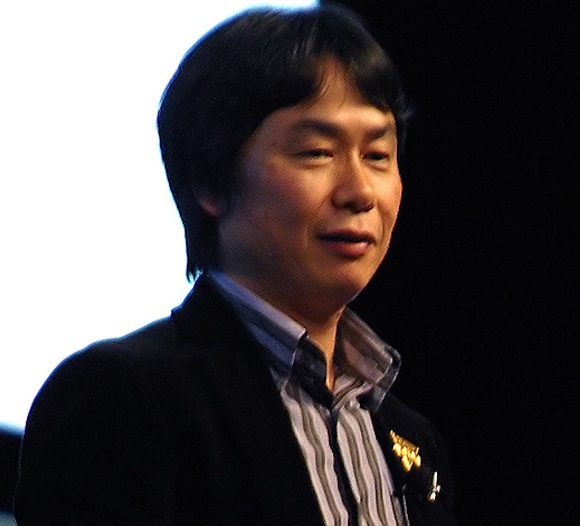
In the latest issue of long-running UK gaming magazine Edge, industry legend and creator of Super Mario Bros. Shigeru Miyamoto sits down to talk about the direction in which Nintendo is heading. During the interview, which spans several pages and touches upon subjects ranging from upcoming title Splatoon to the lack of young talent at the company, the veteran game designer is quoted as saying that casual gamers are “pathetic” for not wanting to delving and getting the most out of video games.
A handful of gaming news sites immediately leapt on this statement and ran with it, hinting that Nintendo may be about to turn their backs on the very people who made products like the Nintendo DS and Wii the hits they were. But did Miyamoto honestly just diss the casual gaming public? We really don’t think so.
Numerous gaming sites are today running articles with headlines focusing on Shigeru Miyamoto’s use of the word pathetic in his Edge interview, focusing on juicier soundbites such as: “Their attitude is, ‘OK, I am the customer. You are supposed to entertain me.’ It’s kind of a passive attitude they’re taking, and to me it’s kind of a pathetic thing.”
But let’s take a closer look at this conversation between Edge and Miyamoto and think a little harder about the language the veteran game designer is using.
In our modern lexicon, words like “pathetic” can be perceived as somewhat acerbic. We use the term in casual conversation when we’re deriding someone or something, and being labelled pathetic is never a nice feeling. For a man who is famous for having hobbies like gardening, taking care of his pets and chilling with the mandolin, such terms seem oddly uncharacteristic of Miyamoto. He may be famously demanding of his staff at work, and is known for writing entire projects off when he’s not completely satisfied, but on the whole he’s known as being a nice guy who views video games as a medium that should be embraced by people of all ages – hence the decidedly family-centric approach Nintendo took with the original Wii.
In his Edge interview–which we can only assume was conducted in Japanese or with the help of a translator since, although he tries, Miyamoto is not known for his English language ability–the magazine broaches on the topic of Nintendo’s main audience, quoting Miyamoto as he describes the kind of people the company does not currently have in its crosshairs:
Miyamoto and his staff are not designing games for “the sort of people who, for example, might want to watch a movie. They might want to go to Disneyland. Their attitude is, ‘OK, I am the customer. You are supposed to entertain me.’ It’s kind of a passive attitude they’re taking, and to me it’s kind of a pathetic thing. They do not know how interesting it is if you move one step further and try to challenge yourself. [If you do that,] you’re going to learn how fun it is.”
Nintendo may have learned from its recent mistakes, and Miyamoto’s interview does indeed suggest that the company aims to shift its focus more towards the kinds of games that many of us knew and loved in Nintendo’s pre-Wii days, but his (or perhaps the translator’s) use of the word “pathetic” here may be a little misleading, and not quite the inflammatory statement some news sites are presenting it as.
Miyamoto may have used the English word pathetic in describing casual gamers, but let’s not forget that the original meaning of the word is “to inspire pity or evoke feelings of sadness for a particular thing or person.” It’s often said that William Shakespeare’s plays have a number of “pathetic” characters, but this isn’t just a bunch of snooty critics dissing old Will’s work; rather it’s that such characters are there to make audiences feel sympathy.
More likely, though, is that the “pathetic” we see here is a translation of the Japanese word kawaisou. Not to be confused with regular old ‘kawaii‘ (cute), kawaisou (written with the characters 可哀相 and meaning poor, pitiable and, yes, pathetic in its original sense of the word) is an expression that is commonly used in Japanese when one expresses feelings of sympathy or regret for another. Your pal just went to surprise his girlfriend at work with bunch of flowers, only to find her in the arms of another man? Kawaisou! Your son or daughter just spent the afternoon building a Lego house only to drop it on the floor as they’re presenting it to you? That’s so kawaisou! You spent the entire day looking forward to eating delicious, limited edition ice-cream when you got back to the office only to find that a certain coworker has eaten it all? You’d better believe that’s kawaisou.
So before we get too upset about Miyamoto’s choice of words here or jump to the conclusion that Nintendo is about to start making nothing but Super Meat Boy-level difficult platformers and giving the very people who made them rich by buying millions of copies of Nintendogs and Wii Fit, let’s all take a deep breath and remember that working with two or more languages can be tricky, and that sometimes things get lost in translation. After all, it really would be “kawaisou” if Miyamoto, one of the nicest guys in gaming, suddenly started getting hate mail, wouldn’t it?
Reference: Edge #271
Feature image: Wikimedia Commons – Vincent Diamante

 Nintendo’s Shigeru Miyamoto shows what to do with your other hand while playing Super Mario Run
Nintendo’s Shigeru Miyamoto shows what to do with your other hand while playing Super Mario Run The reason why Nintendo’s Super Mario smartphone game won’t have in-app purchases is brilliant
The reason why Nintendo’s Super Mario smartphone game won’t have in-app purchases is brilliant Miyamoto: Pikmin 4 is ‘very close to completion’
Miyamoto: Pikmin 4 is ‘very close to completion’ Super Mario creator Shigeru Miyamoto performs Mario theme with hip hop’s The Roots 【Video】
Super Mario creator Shigeru Miyamoto performs Mario theme with hip hop’s The Roots 【Video】 Shigeru Miyamoto’s reason for not creating Wario and Waluigi’s love interests is… kind of mean?
Shigeru Miyamoto’s reason for not creating Wario and Waluigi’s love interests is… kind of mean? McDonald’s new Happy Meals offer up cute and practical Sanrio lifestyle goods
McDonald’s new Happy Meals offer up cute and practical Sanrio lifestyle goods All-you-can-drink Starbucks and amazing views part of Tokyo’s new 170 meter-high sky lounge
All-you-can-drink Starbucks and amazing views part of Tokyo’s new 170 meter-high sky lounge More foreign tourists than ever before in history visited Japan last month
More foreign tourists than ever before in history visited Japan last month Starbucks reopens at Shibuya Scramble Crossing with new look and design concept
Starbucks reopens at Shibuya Scramble Crossing with new look and design concept What happens to Cup Noodle Mystery Meat when you cook it in a rice cooker?
What happens to Cup Noodle Mystery Meat when you cook it in a rice cooker? Disney princesses get official manga makeovers for Manga Princess Cafe opening in Tokyo
Disney princesses get official manga makeovers for Manga Princess Cafe opening in Tokyo Foreign English teachers in Japan pick their favorite Japanese-language phrases【Survey】
Foreign English teachers in Japan pick their favorite Japanese-language phrases【Survey】 Is the new Shinkansen Train Desk ticket worth it?
Is the new Shinkansen Train Desk ticket worth it? Arrest proves a common Japanese saying about apologies and police
Arrest proves a common Japanese saying about apologies and police Tokyo’s most famous arcade announces price increase, fans don’t seem to mind at all
Tokyo’s most famous arcade announces price increase, fans don’t seem to mind at all We try out “Chan Ramen”, an underground type of ramen popular in the ramen community
We try out “Chan Ramen”, an underground type of ramen popular in the ramen community Beautiful new Final Fantasy T-shirt collection on the way from Uniqlo【Photos】
Beautiful new Final Fantasy T-shirt collection on the way from Uniqlo【Photos】 There’s a park inside Japan where you can also see Japan inside the park
There’s a park inside Japan where you can also see Japan inside the park Japanese convenience store packs a whole bento into an onigiri rice ball
Japanese convenience store packs a whole bento into an onigiri rice ball Studio Ghibli releases Kiki’s Delivery Service chocolate cake pouches in Japan
Studio Ghibli releases Kiki’s Delivery Service chocolate cake pouches in Japan Japan’s bone-breaking and record-breaking roller coaster is permanently shutting down
Japan’s bone-breaking and record-breaking roller coaster is permanently shutting down New definition of “Japanese whiskey” goes into effect to prevent fakes from fooling overseas buyers
New definition of “Japanese whiskey” goes into effect to prevent fakes from fooling overseas buyers Foreign passenger shoves conductor on one of the last full runs for Japan’s Thunderbird train
Foreign passenger shoves conductor on one of the last full runs for Japan’s Thunderbird train Our Japanese reporter visits Costco in the U.S., finds super American and very Japanese things
Our Japanese reporter visits Costco in the U.S., finds super American and very Japanese things Kyoto bans tourists from geisha alleys in Gion, with fines for those who don’t follow rules
Kyoto bans tourists from geisha alleys in Gion, with fines for those who don’t follow rules Studio Ghibli unveils Mother’s Day gift set that captures the love in My Neighbour Totoro
Studio Ghibli unveils Mother’s Day gift set that captures the love in My Neighbour Totoro Domino’s Japan now sells…pizza ears?
Domino’s Japan now sells…pizza ears? New Japanese KitKat flavour stars Sanrio characters, including Hello Kitty
New Japanese KitKat flavour stars Sanrio characters, including Hello Kitty Sales of Japan’s most convenient train ticket/shopping payment cards suspended indefinitely
Sales of Japan’s most convenient train ticket/shopping payment cards suspended indefinitely Sold-out Studio Ghibli desktop humidifiers are back so Totoro can help you through the dry season
Sold-out Studio Ghibli desktop humidifiers are back so Totoro can help you through the dry season Japanese government to make first change to romanization spelling rules since the 1950s
Japanese government to make first change to romanization spelling rules since the 1950s Ghibli founders Toshio Suzuki and Hayao Miyazaki contribute to Japanese whisky Totoro label design
Ghibli founders Toshio Suzuki and Hayao Miyazaki contribute to Japanese whisky Totoro label design Doraemon found buried at sea as scene from 1993 anime becomes real life【Photos】
Doraemon found buried at sea as scene from 1993 anime becomes real life【Photos】 Tokyo’s most famous Starbucks is closed
Tokyo’s most famous Starbucks is closed One Piece characters’ nationalities revealed, but fans have mixed opinions
One Piece characters’ nationalities revealed, but fans have mixed opinions We asked a Uniqlo employee what four things we should buy and their suggestions didn’t disappoint
We asked a Uniqlo employee what four things we should buy and their suggestions didn’t disappoint Princesses, fruits, and blacksmiths: Study reveals the 30 most unusual family names in Japan
Princesses, fruits, and blacksmiths: Study reveals the 30 most unusual family names in Japan Studio Ghibli’s new desktop Howl’s Moving Castle will take your stationery on an adventure
Studio Ghibli’s new desktop Howl’s Moving Castle will take your stationery on an adventure Man in Japan arrested for selling modified Super NES Classics with extra games, making 540 bucks
Man in Japan arrested for selling modified Super NES Classics with extra games, making 540 bucks Nintendo answers questions on VR, 5G and staying behind the trends: “Our priority is entertainment”
Nintendo answers questions on VR, 5G and staying behind the trends: “Our priority is entertainment” EarthBound’s creator says “Video games are a shovel” that helps you unearth life’s treasures
EarthBound’s creator says “Video games are a shovel” that helps you unearth life’s treasures Stools made from real taiko drum parts sold by 160-year-old workshop and French designer
Stools made from real taiko drum parts sold by 160-year-old workshop and French designer Super Mario movie delayed, Nintendo posts strange apology
Super Mario movie delayed, Nintendo posts strange apology New voice of Super Mario for CG movie is Chris Pratt, Donkey Kong also will appear
New voice of Super Mario for CG movie is Chris Pratt, Donkey Kong also will appear Nintendo’s god-tier customer service continues as they offer free repairs for Noto earthquake victims
Nintendo’s god-tier customer service continues as they offer free repairs for Noto earthquake victims Brand-new Pokémon games, Sword and Shield, announced for Nintendo Switch【Video】
Brand-new Pokémon games, Sword and Shield, announced for Nintendo Switch【Video】 Super Mario voice actor Charles Martinet “stepping away” from voicing Nintendo characters
Super Mario voice actor Charles Martinet “stepping away” from voicing Nintendo characters Nintendo president Satoru Iwata has died
Nintendo president Satoru Iwata has died Nintendo announces moratorium on Wii U repairs, which ends hardware support for two gens of games
Nintendo announces moratorium on Wii U repairs, which ends hardware support for two gens of games Nintendo eShop closing for 3DS, Wii U next year — Here’s something you might want to do right now
Nintendo eShop closing for 3DS, Wii U next year — Here’s something you might want to do right now Nintendo to stream special animated short ahead of Star Fox Zero’s release【Video】
Nintendo to stream special animated short ahead of Star Fox Zero’s release【Video】 How to deal with Internet trolls, as taught by Pen-Pineapple-Apple-Pen’s singer
How to deal with Internet trolls, as taught by Pen-Pineapple-Apple-Pen’s singer What?!? You can play the Super Mario theme by writing three numbers on a piece of paper?【Vid】
What?!? You can play the Super Mario theme by writing three numbers on a piece of paper?【Vid】 Coronavirus outbreak delays Nintendo Switch Animal Crossing console production, orders
Coronavirus outbreak delays Nintendo Switch Animal Crossing console production, orders
Leave a Reply